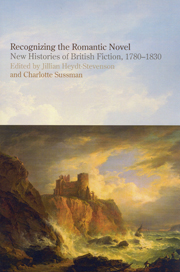Book contents
- Frontmatter
- Contents
- Acknowledgements
- Notes on Contributors
- Preface
- 1 ‘Launched Upon the Sea of Moral and Political Inquiry’: The Ethical Experiments of the Romantic Novel
- 2 Bad Marriages, Bad Novels: The ‘Philosophical Romance’
- 3 Enlightenment or Illumination: The Spectre of Conspiracy in Gothic Fictions of the 1790s
- 4 Burney's Conservatism: Masculine Value and ‘the Ingenuous Cecilia’
- 5 ‘All Agog to Find Her Out’: Compulsory Narration in The Wanderer
- 6 A Select Collection: Barbauld, Scott, and the Rise of the (Reprinted) Novel
- 7 Austen, Empire and Moral Virtue
- 8 Fanny Price's British Museum: Empire, Genre, and Memory in Mansfield Park
- 9 Between the Lines: Poetry, Persuasion, and the Feelings of the Past
- 10 Scholarly Revivals: Gothic Fiction, Secret History, and Hogg's Private Memoirs and Confessions of a Justified Sinner
- 11 Sympathy, Physiognomy, and Scottish Romantic Fiction
- Works Cited
- Index
3 - Enlightenment or Illumination: The Spectre of Conspiracy in Gothic Fictions of the 1790s
- Frontmatter
- Contents
- Acknowledgements
- Notes on Contributors
- Preface
- 1 ‘Launched Upon the Sea of Moral and Political Inquiry’: The Ethical Experiments of the Romantic Novel
- 2 Bad Marriages, Bad Novels: The ‘Philosophical Romance’
- 3 Enlightenment or Illumination: The Spectre of Conspiracy in Gothic Fictions of the 1790s
- 4 Burney's Conservatism: Masculine Value and ‘the Ingenuous Cecilia’
- 5 ‘All Agog to Find Her Out’: Compulsory Narration in The Wanderer
- 6 A Select Collection: Barbauld, Scott, and the Rise of the (Reprinted) Novel
- 7 Austen, Empire and Moral Virtue
- 8 Fanny Price's British Museum: Empire, Genre, and Memory in Mansfield Park
- 9 Between the Lines: Poetry, Persuasion, and the Feelings of the Past
- 10 Scholarly Revivals: Gothic Fiction, Secret History, and Hogg's Private Memoirs and Confessions of a Justified Sinner
- 11 Sympathy, Physiognomy, and Scottish Romantic Fiction
- Works Cited
- Index
Summary
What is enlightenment? In the twentieth century, scholars have found the term ‘the Enlightenment’ a convenient designation for the intellectual history of the eighteenth century, although there has been little agreement between different scholars, disciplines and national traditions about what the term might mean. In his landmark study The Philosophy of the Enlightenment, first published in German in 1932, and belatedly translated into English in 1951, Ernst Cassirer (1874–1945) defined the Enlightenment as ‘a value-system rooted in rationality’, whose history was bounded by the lives of two philosophers, Gottfried Wilhelm Leibniz (1646–1716) and Immanuel Kant (1724–1804). In Cassirer's intellectual history, the term ‘Enlightenment’ denotes the major movement in the history of ideas in eighteenth-century Europe, defining the modernity of the period, championing rationality over faith and superstition, reason and liberty over custom and tyranny, science over religion. Yet in the period itself, the term ‘Enlightenment’ was almost unknown: the Oxford English Dictionary suggests the term was not used in English in the modern sense until the 1860s, when it was derived from a translation of the German Aufklärung.
This essay explores the coincidence between three phenomena in the intellectual life of late 1790s' Britain. The first is the emergence of the subgenre of Romantic fiction that later became known as the gothic novel, particularly that of Ann Radcliffe (1764–1823) and Matthew Lewis (1775–1818), but also in a group of minor novelists.
- Type
- Chapter
- Information
- Recognizing the Romantic NovelNew Histories of British Fiction, 1780-1830, pp. 77 - 98Publisher: Liverpool University PressPrint publication year: 2010

